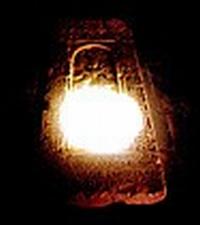Julian Cope - "Citizen Cain'd"

Well, it's not pop music, for those expecting such. Interpreter was the last pop-oriented album from Liverpool's psychedelic genius Julian Cope, in 1996. In the intervening nine years, it seemed like he'd turned his attentions away from music almost completely, especially after the release of his book The Modern Antiquarian. After that, it was year after interminable year of hearing only that a new book was on the way, or an ambient album (Odin) or some less-than-great Krautrock/glam-freakage (An Audience With the Cope) would appear, frequently to disappoint. Which, in some perverse way, is okay, because it makes the excellent Citizen Cain'd even better. This is shamanic pop music of the highest, most lysergic order, existing in a universe where the Stooges conquered the Top Ten and new wave never happened. Embracing lo-fi production methods, Cope and band summon the spirit that infused the first MC5 record -- a live, first-takes-only mentality. Nowhere is this more apparent than on the second track, "I Can't Hardly Stand It," which solidifies Julian's garage rock credibility, with a punky garage rocker that pays homage to Cope's heroes the Monks, who incessantly recorded with all the meters firmly in the red. "Dying to Meet You" is also a great rocker, with some invigorating guitar leads and a barely controlled Julian on vocals. "Feels Like a Crying Shame" opens the second half of the album with almost 12 minutes of pure rock groove, with nimble drums keeping time as the acoustic and electric guitars move in and around each other, building and building over the length of the track. This is rock-as-trance music. All in all, an excellent return to song-based songwriting from the Drude, a good entry point for people new to the man, or to those who may have (briefly) lost the faith. [This album was released on two CDs, running under a total 72 minutes. The reason given at the time from Julian was that the album was too psychically exhausting as one piece, and split it up. And while one can appreciate the artist's experience of listening to his or her own work, it's kind of inconvenient to try to listen to in its entirety.]
4 stars

0 Comments:
Post a Comment
<< Home